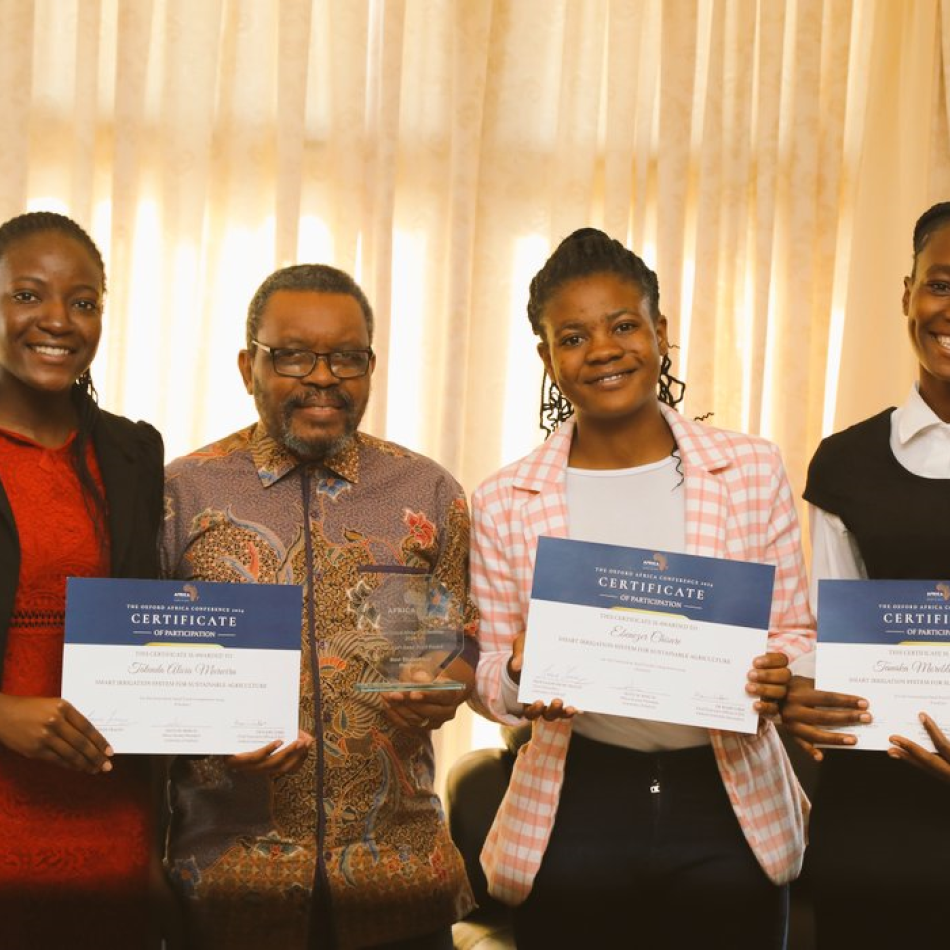THREE first-year students from the National University of Science and Technology (NUST) have achieved global recognition for developing an innovative smart agriculture irrigation system.
The system, which aims to promote precision agriculture, leverages advanced sensor technologies to optimise the irrigation process. By doing so, it significantly reduces water costs while ensuring plants receive the optimal amount of water needed for their growth.
Tanaka Gudza, a computer science student, who was the team leader, Ebenezer Chisare, a data analyst and Tatenda Murwira, a technical co-ordinator participated in the global Innovation Seed Fund competition which was held at the University of Oxford, and they came first.
For their efforts, they were awarded certificates and a medal. Their innovation is part of the Heritage-Based Education 5.0 initiative, which mandates that educational institutions should focus on creating solutions that address real-world social challenges. Heritage-Based Education 5.0 emphasises the integration of heritage, technology and innovation in the curriculum to produce graduates who are not only knowledgeable but also capable of generating practical solutions to societal issues.
Since the adoption of Heritage-Based Education 5.0, several university students have been producing prototypes to address national challenges.
Through Education 5.0 the Second Republic wants to produce graduates who can solve problems, a departure from the inherited colonial education system which promoted innovation graduates with a worker mentality who did not innovate to create jobs.
The smart agriculture irrigation system developed by the three students exemplifies how academic learning can be directed towards impactful innovations. By focusing on precision agriculture and water conservation, their project directly addresses critical issues such as resource management and sustainable farming practices, which are vital for both local and global communities.
In a statement yesterday, Nust said the students lifted the country’s flag high by shrugging off competition from other global competitors to bag the second prize.
“The students presented an innovation on Smart Irrigation System for Sustainable Agriculture. The innovation aims to implement advanced technology solutions to optimise water usage in agriculture. It involves the installation of sensor-based irrigation systems that monitor soil moisture levels, weather conditions and crop water requirements,” said Nust.
The students developed a software platform to analyse the collected data and provide real-time insights and recommendations to farmers for optimised irrigation.
“The innovation also focuses on promoting water conservation practices and efficient water use in agriculture through training programmes and awareness campaigns. The impact of the smart irrigation systems is assessed through monitoring and evaluation activities, including measuring water savings, crop productivity and environmental sustainability,” said Nust
The university said through the innovation, farmers would significantly save water while improving crop yields and ensuring reduced cost of irrigation as well as increasing climate resilience and environmental conservation.
“By integrating technology, data analysis and water conservation practices, the Smart Irrigation System for Sustainable Agriculture revolutionises agricultural practices and promotes sustainable agriculture in Zimbabwe and other countries grappling with water scarcity and climate change challenges,” reads the statement.
Nust communication and marketing director, Mr Thabani Mpofu said the students have embraced the Heritage-based Education 5.0.
“We are excited that our students are developing globally competitive smart innovations that address pressing climate change impacts and promote sustainable agriculture. This is evidence that the Heritage-based Education 5.0 has redefined students’ learning experience and challenges them to embrace technology and apply critical thinking to solve real-life problems,” said Mr Mpofu.
Nust Pro-Vice-Chancellor for Innovation and Development, Dr William Goriwondo said the students’ innovation is in sync with the National Development Strategy 1 (NDS1), which require universities to contribute to national growth.
He said the students’ innovation will complement the revolution taking place in the agricultural sector, which has seen the country achieving national food security.
“Agriculture is an important pillar for the provision of food security and it is innovations like these that benefit the nation. We are going to assist the students to develop the innovation further until it is fully commercialised into a start-up business,” said Dr Goriwondo.
He said as the university works to complete its innovation hub and the Prof Phineas M Makhurane Technovation Centre, such innovations will be incubated as the country is on a drive to promote knowledge-driven development. — @nqotshili, Chronicle









